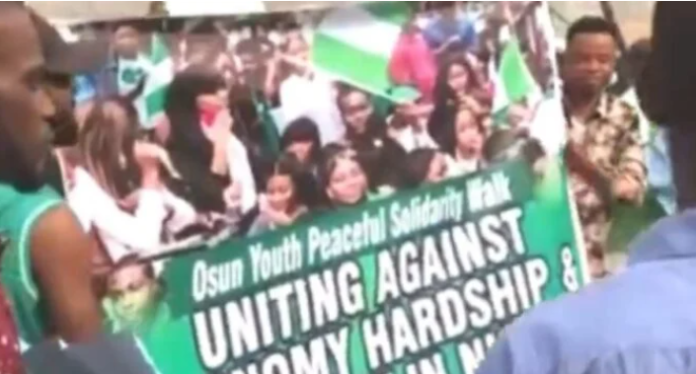Protests over living conditions erupted in Minna, the Niger State capital on Monday 5 February, as well as in Kano. Two days later, another protest was held in Suleja, also in Niger state. One of the placards spotted at the protest read, “No food, we are dying of hunger.”
These protests have been organised to voice mass dissatisfaction over the state of the economy and the quality of life of the people.
In response, the presidency declared it will release food items from Nigeria’s food reserves to the public to bring down food prices nationwide. Its directive to that effect was announced by the President’s Chief of Staff, Mr Femi Gbajabiamila following an emergency meeting of the Presidential Committee on Emergency Food Intervention..
But the harsh conditions of people’s lives stem from the economic programme of the government. Its neoliberal reforms such as the scrapping of fuel subsidies, the raising of electricity tariffs, the hiking of tuition fees, and the floating of the naira, have culminated in ballooning inflation rates and scarcity of necessary commodities.
The policies which the All Progressive Congress promised would revamp the economy have begun to work against the people, contrary to the lofty goals the government claimed they would achieve. In the past nine months, we have witnessed a rapid worsening of the already precarious standard of living of working people, more immiseration and poverty, while the political class continues to loot public resources that could have been used to provide social services.
The rapid crash of the naira is, of course, an inevitable consequence of floating it. And it has poured fire on the ravages of inflation, given that Nigeria depends on imports to supplement its food supply, as well as that of other consumer goods.
These policies were championed by all four of the mainstream political parties during the 2023 presidential elections. All mainstream media outlets presented them as the rational and obvious economic path to take. Now the resultant hardship has worsened the spate of violence across the country. Kidnapping, banditry, armed robbery, ethnic and religious violence, etc., have become the order of the day
These disastrous policies have been endorsed by the World Bank which recently said, “the World Bank will continue to support the reforms of President Tinubu’s administration through the supportive instrument that we have and we will be stepping up our financial support to Nigeria in line with all the different initiatives that are being taken and all the needs that the economy has.”
The International Monetary Fund (IMF) has also declared its support for these reforms stating, “President Tinubu has moved quickly with important reforms including ending the fuel subsidies and unifying the official exchange rates. We welcome these initial bold reforms because we see them as paving the way towards stronger and inclusive growth.”
The Nigerian people of course continue to be the victims of these reforms, as their cost-of-living skyrockets without any commensurate increase in wages. We are in a child malnutrition crisis. More than a third of all Nigerian children have stunted growth because of malnutrition. According to UNICEF, malnutrition is a direct or underlying cause of 45% of the deaths of Nigerian children aged five years old and below. As rising prices force more and more people into poverty, children will suffer the most.
These reforms have real-life victims, lives that are being destroyed. But the Tinubu administration does not understand that it has blood on its hands. “Necessary growing pains” the president once called it in a TV address.
The protests that are breaking out across the country are an indication that the Nigerian people do not intend to bear these “growing pains” in silence.
Mass mobilisations are already underway, and students have been mobilising protests against tuition fee hikes as well. There is an urgent need to unite and coordinate these strains of revolt into a national movement that can bring the Tinubu administration to heel. There needs to be efforts towards threading together the various issues which all have the same root problem, so that we act with unity and precision.
The security forces have already swung into action, demonstrating yet again that our fight against police brutality is an unfinished struggle. The attacks on our public tertiary institution must be understood as part of a coordinated attack on the poor, to strip them of all avenues of economic, personal and academic advancement. Students are dropping out of school in large numbers because they cannot pay the new fees. There is an urgent need for a general strike, as well as coordinated nationwide protests to force a change in policy direction, or better yet, force the ruling elites from power.
by Kayode Somtochukwu ANI









